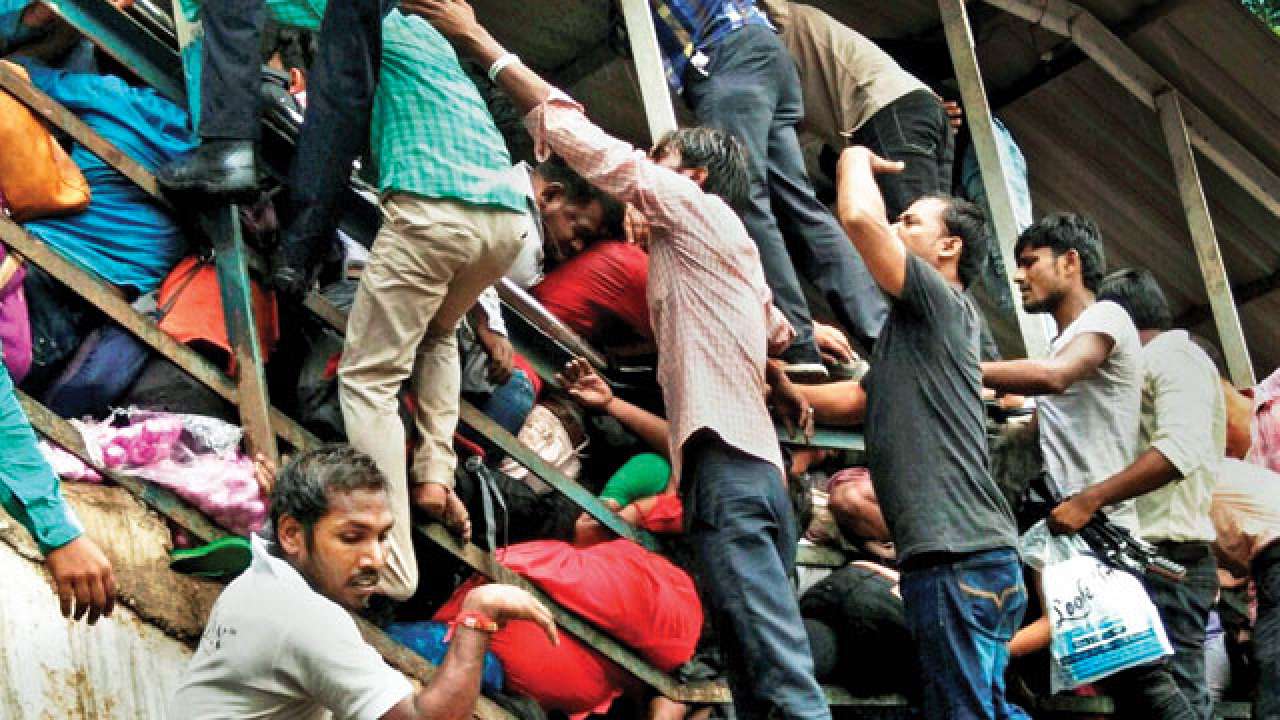
A few days back there was a massive tragedy, largely human-made, on a foot overbridge of the Elphinstone railway station in Mumbai. This gruesome, sad event was reported with grief, disgust and dismay in the media, with great intensity for a couple of days. After that it has been forgotten. The Gorakhpur hospital children deaths also held public attention for a couple of days. We should not also forget the spate of railway accidents in UP and elsewhere over the past month or so. There was political blame game following the Mumbai tragedy rather than any demand for genuine reform.
There is clearly a Standard Operating Procedure (SOP), followed by the government of the day, for these occurrences which get repeated every other day, reflecting the poor regard for human life in our national psyche. While any government will deny the existence of a ‘manual’ in this regard, the standard response to a tragedy would take the following course: (i) if the tragedy is in a remote area, not easily accessible by the press or the politicians, ignore it (thus 200+ deaths in Yavatmal, due to pesticides inhalation while spraying GM cotton has not yet been officially recognised as a tragedy); (ii) the daily endemic child molestation/ rape/ drunken-driving accident etc. to be totally ignored, unless the event happens in a metropolitan city like in the case of Nirbhaya or Pradyuman (the student of Ryan International School) in NCR; (iii) or a major event, like the Mumbai footbridge tragedy, occurring in a metropolitan area. The SOP stipulates that in events at (i) and (ii), ignore the tragedy, and proceed as if nothing happened. Serious action is required only for events of the nature at (iii) above.
The procedure outlines the following steps: (i) an immediate high-level political visit to the spot, frequently if possible, disrupting the immediate relief action by local administration; (ii) expression of great grief; (iii) announcement of a few lakh rupees in ‘compensation’ for the relatives of deceased, and one-third of this amount for the ‘seriously injured’; (iv) constitute an inquiry, either magisterial or judicial, or by SIT or CBI, depending on the ‘anger’ expressed in the media reports; (v) make a statement that ‘we will get to the bottom of this’, and ‘fix responsibility’; (vi) announce loftily that the ‘guilty will be punished’; and finally (vii) a statement that ‘law will take its own course’. After these steps are taken nothing further really needs to be done; it is optional for the minister to have an 8-hour meeting on the spot of the tragedy, with senior officers of the department, ostensibly to ensure that such occurrences do not ‘recur’ – the SOP does not clarify why that 8-hour meeting could not have been held a week or a month or a year earlier, thus preempting the tragedy! In exceptional cases, the minister concerned could resign — but this is really an unnecessary reaction. Lal Bahadur Shastri had tendered his resignation following the Ariyalur train disaster in 1956.
Do the authorities in the Centre or in the states not know the condition of the district or tehsil hospitals? The PEW Foundation of USA ranked India as having the worst school education standards in the world! Only last week the World Bank Report on the abysmal schooling standards in India was released — the list of ‘inimical messengers’ can go on, who point to terrible standards in Indian schools, both government and private. Has any minister travelled in a second-class compartment (or in third class which was in existence till a couple of decades back), to see the actual conditions there; Mahatma Gandhi does not count – he was not a VIP, or a minister. Does the average Chief Secretary or MP realise the condition in which a Bihari travels during Chhath puja from Kolkata or Mumbai to Darbhanga? Is this democracy for the citizen? Or do only the MPs and ministers and senior officials, and of course billionaires, count.
The ground situation must be drastically remedied. The common man must come into focus. The Allahabad High Court reportedly issued an order that the children of all ministers, MPs, MLAs and senior state government officers should only go to the local government school. No one took note of this order. Would the massive tragedy due to lack of oxygen cylinders have occurred in Gorakhpur if the son of the local MLA had been admitted with dengue or Japanese Encephalitis to the general ward in the civic hospital? Will the Chief Minister of Bihar take the train, unreserved II Class, from Muzaffarpur to Delhi, for his next meeting? All this may sound harsh and unpalatable. The ground reality is that the conditions are often unacceptable for the common man. A radically new way to effectively look at the services available to the ordinary citizen is now imperative.
The author is a former cabinet secretary. Views expressed are personal.